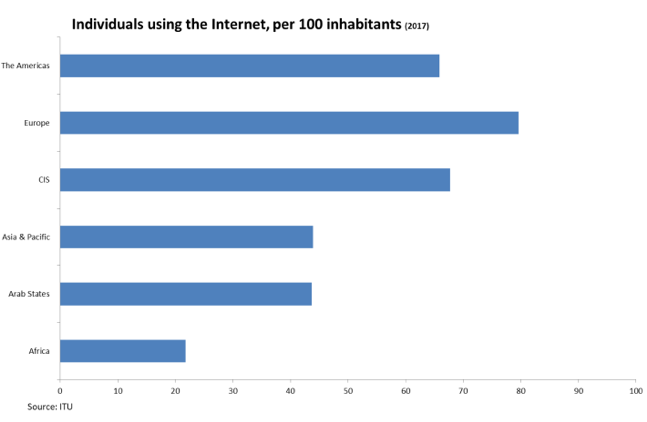Last month scientists at Tufts University announced that they had created a sensor that can be mounted on a tooth to track diet quality and make tailored nutritional recommendations

If we bring more players into the ICT investment space, we can start to socialize the costs of investments to better reflect the disbursement of returns. This should significantly increase ICT infrastructure development. But it starts with thinking about the internet differently. Connecting a population is not just about economic growth or social inclusion. It’s about keeping your country from missing the Fourth Industrial Revolution, furniture-building robots and all.
by
Eric White* and
Oren Pinsky**
Around the same time, Microsoft announced that it had developed software that could translate Chinese to English as fast and as accurately as a human. To top it off, just last week the world learned that there is now a robot that can autonomously assemble furniture.
Such stories make it clear: to read the science and technology news today is to see a world of rapid progress and infinite potential.
And from one perspective it is.
But we believe that now is a good time to remind everyone of a fundamental limitation of the ability of technology to make the world a better place. All of these advances in one way or another rely on the internet - a tool which remains foreign to over half of the world’s population.
The Broadband Commission for Sustainable Development says that the world will not even achieve 50% internet use until the end of this year. If the world maintains current internet user growth rates – a big if – we won’t approach 100% global internet adoption for well over two decades.
Internet of Things
In that time experts predict that the Fourth Industrial Revolution will be in full swing. We will be connected to a vast Internet of Things network that will feed unimaginable amounts of data into ever more advanced artificial intelligence tools, enabling us to create new and highly disruptive products and services that generate huge amounts of wealth. Or, at least those of us with an internet connection will be.
This looming and unequal wealth explosion is important because it will exacerbate the current fault lines of global inequality. Internet use is overwhelmingly concentrated in advanced economies, and the biggest gaps are in the world’s poorest areas.
The map and chart below shows hot spots of internet connectivity in most developed countries and huge opportunities to increase access to the internet in developing countries.
If this situation is not resolved soon the benefits of the Fourth Industrial Revolution will accrue principally to the global haves, leaving the have-nots even further behind.

This needs to change, and a good first step is to flip the argument. If governments, whose requests to development banks drive the MDB loan portfolio, cannot justify ICT investments on sustainable development grounds, perhaps they can do so by showing how connectivity is now imperative to taking part in the Fourth Industrial Revolution. This might also help generate the political will to clarify regulatory regimes and make the sector more transparent and attractive to non-traditional private investors.
At the World Economic Forum we are working with governments and regional bodies on ways of broadening the pool of connectivity investors through our Internet for All project.
New research that we have just launched shows that in areas of low internet use mobile operators face a difficult investment environment. Though in some cases the returns to connectivity investments can exceed the costs in less than two years, these returns are accrued to the economy as a whole rather than to a private investor. Network operators often need co-financing to make an investment profitable.
If we bring more players into the ICT investment space, we can start to socialize the costs of investments to better reflect the disbursement of returns. This should significantly increase ICT infrastructure development. But it starts with thinking about the internet differently. Connecting a population is not just about economic growth or social inclusion. It’s about keeping your country from missing the Fourth Industrial Revolution, furniture-building robots and all.
*Project Lead, Internet for All, Global Leadership Fellow , World Economic Forum
**Project Coordinator, Internet for All, Latin America, World Economic Forum Geneva




